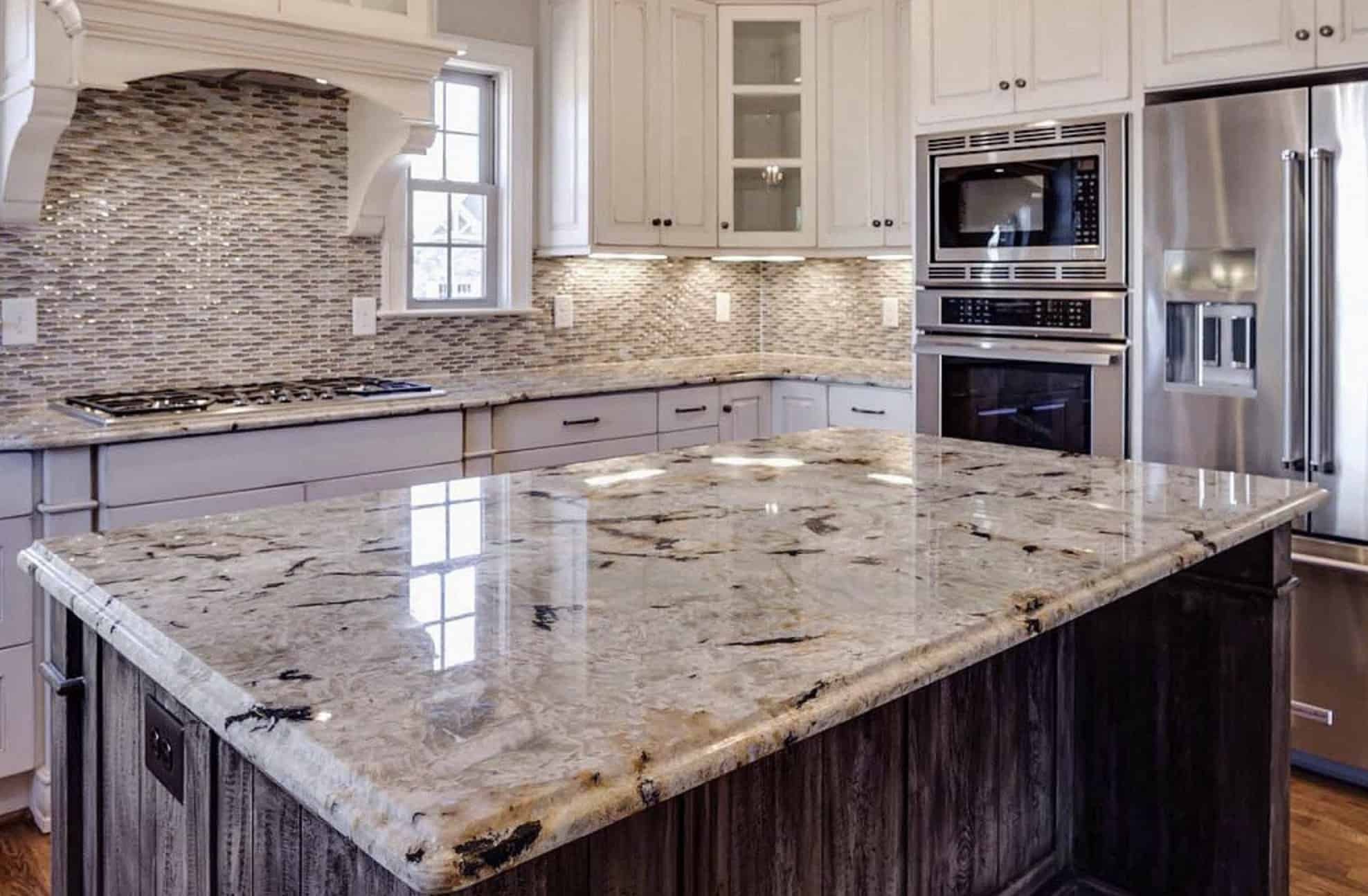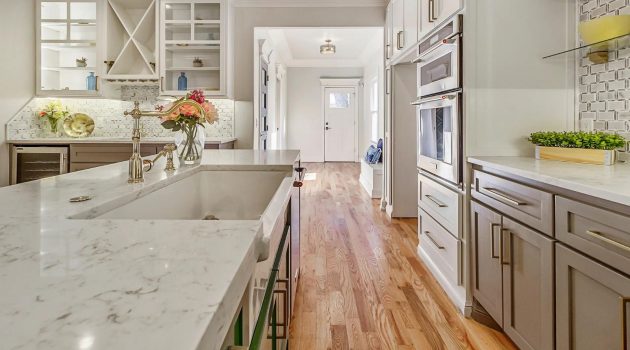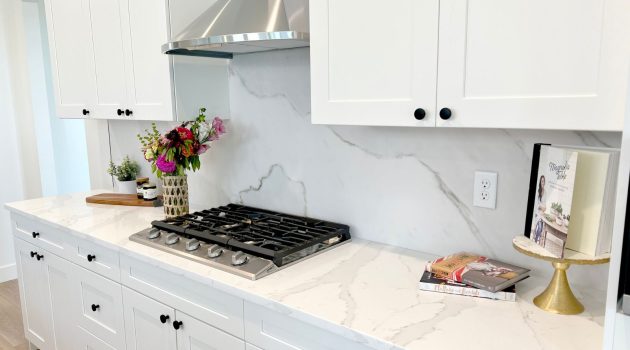Are you considering granite countertops for your home? This popular choice for kitchens and bathrooms has much to offer, but weighing the pros and cons before deciding is essential.
In this article, we’ll explore the advantages and disadvantages of granite countertops, helping you determine your home’s design.
1. Understanding Granite Countertops
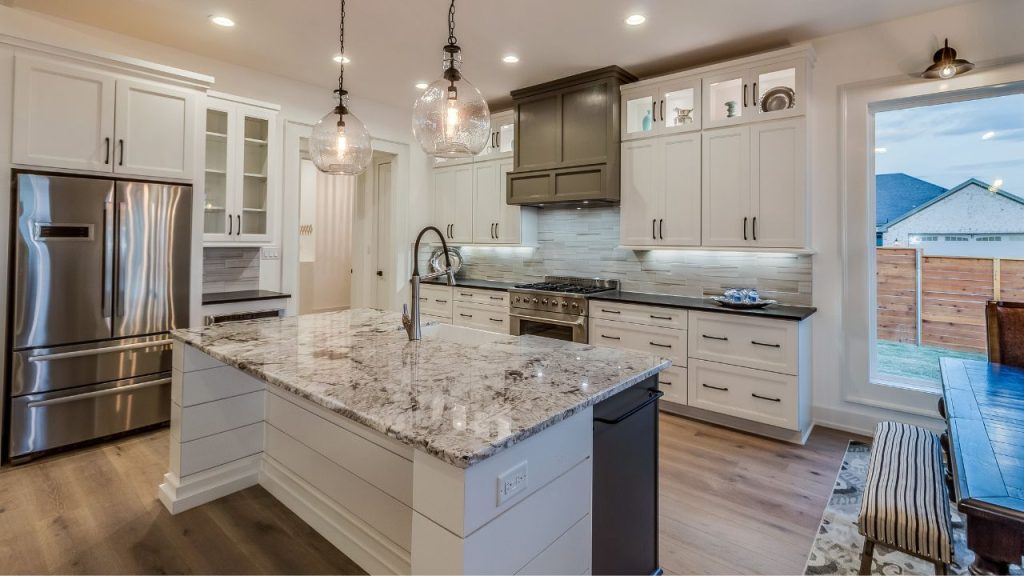
Granite is an igneous rock composed mainly of feldspar, mica, and other minerals. It is known for its natural beauty and durability, making it a popular choice for kitchen countertops.
When you opt for granite countertops in your kitchen, you choose a natural product that has been used for centuries worldwide.
Granite countertops come in various colors, patterns, and prices, so you’ll have plenty of options to suit your taste and budget.
These countertops can also add value to your home, as many homebuyers appreciate granite’s timeless beauty and practicality.
When choosing between the various granite countertop options, consider the colors, characteristics, and patterns that fit your kitchen’s design and functionality.
For example, you may prefer darker shades of granite to minimize visible seams, as they typically require a lighter sealing process.
Undermount sinks can also be easily installed to enhance your kitchen’s overall look and functionality.
Incorporating granite countertops into your kitchen can enhance its aesthetic appeal and offer many practical benefits.
However, be aware of the potential drawbacks to ensure that you make an informed decision based on your specific needs and preferences.
2. Pros of Granite Countertops
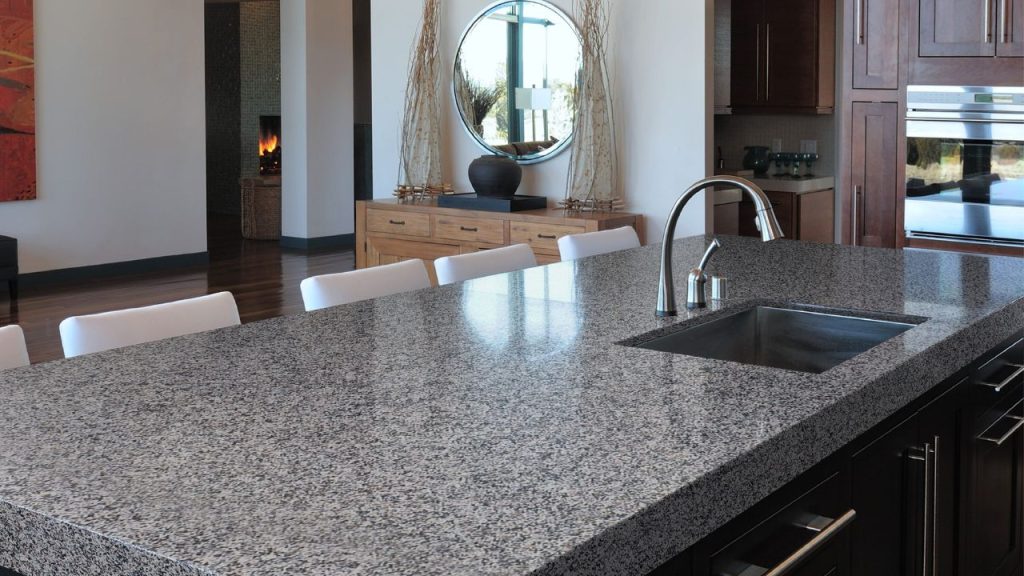
Beauty and Variety
Granite countertops offer a beautiful and unique appearance made from natural stone. No two slabs are the same, giving your kitchen a unique look.
With a wide range of colors, such as gray, pink, white, black, red, and more, you can easily find a granite countertop that complements your overall design.
Durability
One of the major advantages of granite countertops is their durability. As a hard and sturdy material, granite is resistant to heat, stains, and scratches.
This means that your countertops, hot pans, and knife blades can withstand daily use without damage. You can confidently use your countertops without fear of ruining their beauty or functionality.
Value Adding
Investing in granite countertops is a smart choice for adding value to your home. Granite is often considered a high-end countertop material, making it a desirable feature for potential buyers.
Not only will it enhance your kitchen’s appearance, but it may also increase your home’s resale value.
Resistance to Heat and Stain
Granite countertops are heat and stain-resistant, making them perfect for a functional kitchen. You can place hot pans directly on the surface without worrying about causing damage or discoloration.
Moreover, granite’s resistance to stains means that even if you spill coffee, wine, or other liquids, they are less likely to leave a lasting mark on your countertop.
Hygiene
Granite countertops are sanitary for your kitchen as they do not easily harbor harmful bacteria.
With proper sealing and maintenance, you can maintain a hygienic cooking environment where food can be prepared safely.
Your countertops will be visually appealing and contribute to a clean and healthy kitchen space.
3. Cons of Granite Countertops
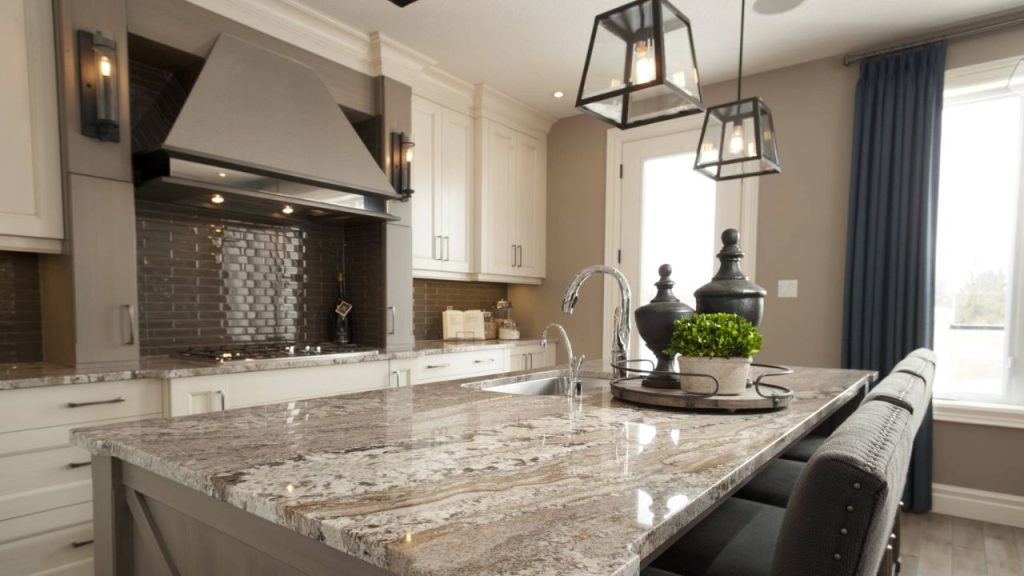
Sealing and Maintenance
Granite countertops may require sealing to protect them from liquids and stains. While they are generally low-maintenance, you may need to apply a sealant periodically to keep them in top condition.
Not doing so can result in stains or even bacteria growth on your countertop over time. Furthermore, clean up spills promptly to reduce the potential for long-term damage.
Susceptibility to Cracks and Stains
Although granite is durable, it can be susceptible to cracks and stains if not properly maintained.
In particular, lighter-colored granite may be more prone to showing stains and may require more frequent sealing to maintain its original appearance.
Additionally, cracks can occur due to impact or excessive weight being applied to the surface, so handling your granite countertop with care is essential.
Cost Considerations
Granite countertops can be quite expensive, especially if you’re working within a budget.
Prices can vary significantly depending on the quality and rarity of the granite, but generally, expect to pay around $50 to $200 per square foot for the material and installation.
To find a balance between cost and quality, consider exploring different types and colors of granite and compare prices from various suppliers.
Weight
Granite is a heavy material, which can pose some challenges during installation and may require additional support in your kitchen or bathroom.
Make sure your cabinets and flooring can handle the weight of a granite countertop before committing to the purchase.
Additionally, the weight of granite makes it difficult to work with for do-it-yourself projects, so professional installation is often recommended.
4. Granite Vs. Other Countertop Materials
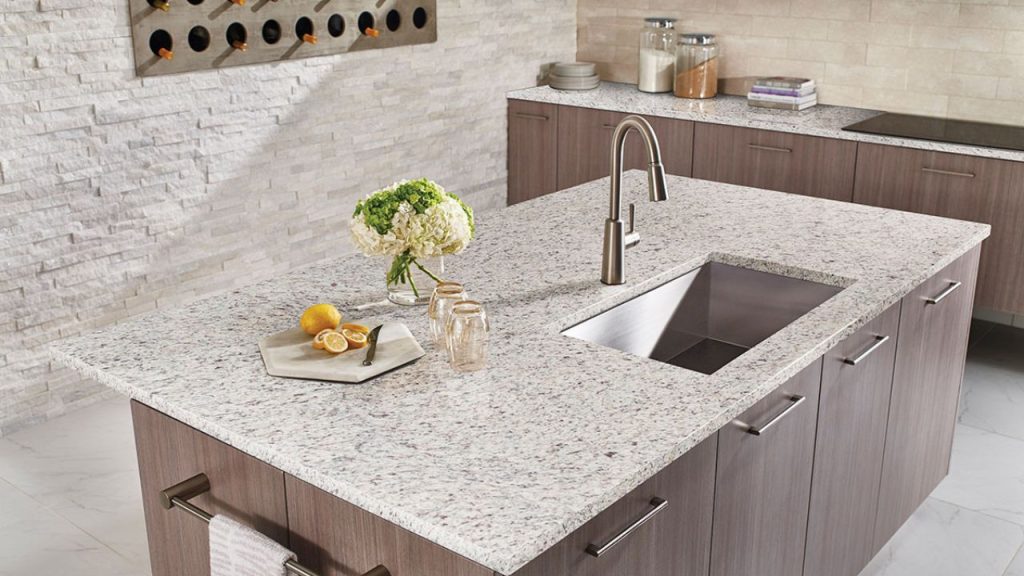
Granite vs Quartz
Both granite and quartz are popular options for countertops, but they have some key differences.
- Composition: Granite is a natural stone, while quartz is engineered from ground quartz and resin.
- Variety: Granite offers a multitude of unique patterns and colors, while quartz is available in a wide range of colors and styles, including those that mimic natural stone.
- Durability: Granite is heat and scratch-resistant but may be slightly more prone to chipping and cracking than quartz. Quartz is also heat and scratch-resistant but may be less resistant to very high heat.
- Maintenance: Granite countertops need sealing periodically to prevent staining. Quartz countertops are nonporous, which means they don’t require sealing and are more resistant to stains.
- Price: Granite countertops have a wide range of pricing, whereas quartz countertops can be slightly more expensive.
Granite vs Marble
When comparing granite to marble countertops, consider the following points:
- Composition: Both granite and marble are natural stones, with marble being softer and more porous than granite.
- Variety: Granite showcases various colors and patterns, while marble typically features more subtle patterns and veining.
- Durability: Granite is more resistant to heat, scratches, and stains than marble. Marble is prone to etching and staining from acidic substances.
- Maintenance: Granite countertops need occasional sealing to prevent staining. Marble countertops require more frequent sealing due to their porous nature and susceptibility to etching.
- Price: Granite can be more budget-friendly than marble, which is generally more expensive due to its luxurious aesthetic and higher maintenance requirements.
While granite, quartz, and marble offer unique qualities and benefits, considering your lifestyle, budget, and design preferences will help you choose the best countertop material for your home.
5. Granite Countertops Buying Guide
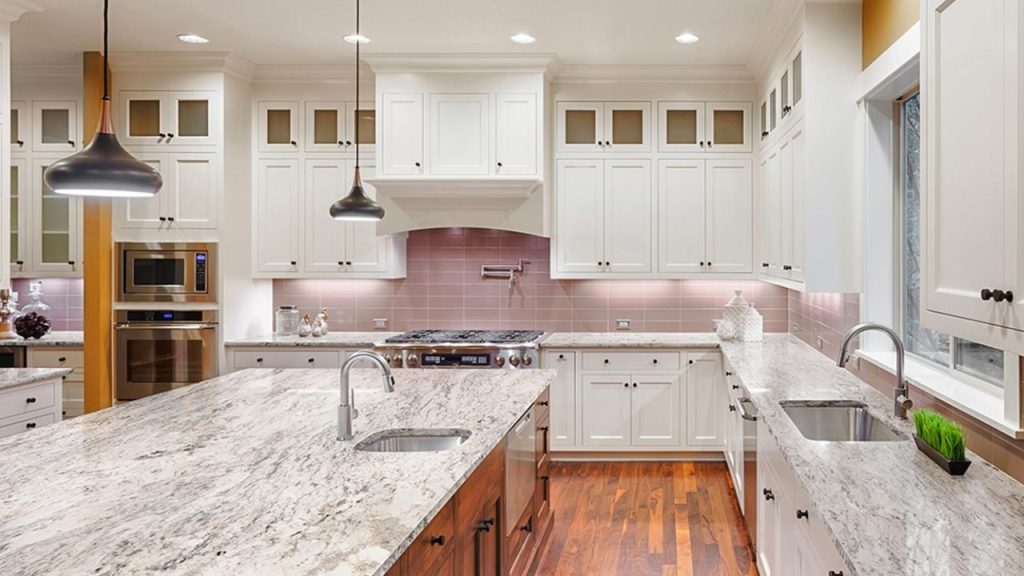
When looking for granite countertops, you’ll encounter a variety of options and factors to consider.
Here’s a friendly guide to help you navigate through this process.
First, consider the wide range of pricing available for granite countertops. Prices can vary widely based on the quality and origin of the granite, as well as the complexity of your project.
To get the best value, shop around and request quotes from different suppliers. Make sure to include the cost of installation in your budget.
Granite countertops are known for their durability. They resist damage from heat and scratches better than many other countertops and tend to have long lifespans.
Your granite countertop will likely add value to your home, which can be a significant benefit if you plan to sell.
One potential downside is that granite countertops can appear dated or have a busy design. This is due to the natural stone’s unique appearance, which may appeal to only some.
Consider whether granite’s visual appeal suits your taste and the style of your kitchen or bathroom before deciding.
Remember that granite countertops might require periodic sealing to maintain their appearance and prevent staining. The frequency of sealing depends on the granite type and its porosity level.
Following the manufacturer’s recommendations is essential to maintaining your countertop in good condition.
Lastly, granite countertops could be DIY-friendly. Installation can be challenging and requires professional expertise.
Additionally, any repairs or modifications are difficult and may need specialized skills.
To summarize, when considering granite countertops:
- Explore various pricing options
- Factor in durability and added home value
- Evaluate the design’s appeal and how it fits with your space
- Prepare for periodic sealing and maintenance
- Plan for professional installation and potential repairs
Frequently Asked Questions
What are the advantages and disadvantages of granite countertops?
Granite countertops have several advantages, such as low maintenance, being sanitary, versatile, available in a wide range of prices, and adding value to your home. However, there are also disadvantages like the potential for a dated look, busy designs, visible seams, the need for sealing, being prone to cracking and fading, being cold, heavy, and potentially expensive.
How do granite countertops compare to quartz?
Granite and quartz countertops share similarities, like durability and resistance to heat and scratches. However, granite countertops are natural stones, while quartz countertops are engineered. This means quartz countertops can have a more uniform appearance and are less prone to fading. Granite countertops may need sealing, while quartz countertops are typically low maintenance and don’t require sealing.
Is sealing required for granite countertops?
Yes, sealing is required for granite countertops. This process helps protect the surface from stains, bacteria, and moisture. The frequency of sealing depends on the granite color and usage but is generally recommended once every 1-2 years.
What is the cost of installing granite countertops?
The cost of installing granite countertops can vary depending on the specific type, color, and quality of the granite, as well as the size and complexity of the installation. The price range can be from $5 to $15 per square foot for granite tiles, which are more cost-effective but may not be as desirable as solid slabs.
Can granite countertops handle the heat from pots and pans?
Granite countertops are highly resistant to heat, so they can handle hot pots and pans without experiencing damage. However, trivets or heat pads are always a good idea to prevent any potential harm to your countertops.
What are the best alternatives to granite countertops?
Some popular alternatives to granite countertops include quartz, solid surface, laminate, wood, concrete, and stainless steel. Each alternative has pros and cons, so consider budget, style preferences, and maintenance requirements when choosing the right material for your kitchen.
